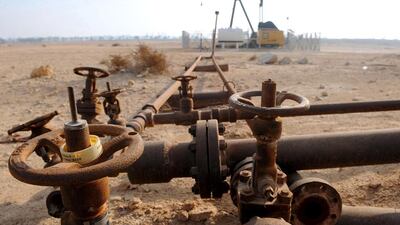Oil prices have stabilised in the past few days after the precipitous falls of recent weeks as market participants absorb last week’s decision by Opec to take a laissez faire approach and let market forces determine crude oil supply.
Brent crude futures in London were hardly changed late in the Middle East yesterday having recovered some ground after falling below US$70 a barrel earlier in the week, the lowest level since early 2010.
January Brent futures were up 9 cents at $70.63, while earlier January Oman crude futures closed down $1.11 at $69.44 a barrel.
Oil market analysts have been looking for the best way to evaluate Opec policy, which is never fully set out by the members. Rather, the words and deeds of Saudi Arabia, the group's de facto leader, are looked to for signs as to how the battle for export markets is likely to play out in the coming months.
It has been widely assumed from statements by the Saudi oil minister Ali Al Naimi that the Saudi strategy is to fight for market share and ride out a period of lower prices in the hope that it will force off the market some higher-cost production – particularly US “unconventional” (shale and other) production – and give the world economy time to pick up again.
There are, however, a number of analysts who consider this policy either incorrect or misguided.
Saudi Arabia has a more complicated strategy, Tom James, the lead consultant at Singapore and Dubai-based Navitas Resources, argues. “I think Saudi wanted to test the market to see how finely balanced the market really is. The drop from $115 to $100 was the justified drop in the eyes of most oil firms due to oversupply and lack of call on Opec crude,” Mr James said. “But the drop from $100 to $80 was due to the dollar.”
In other words, the strength of the US dollar versus other currencies has played a large part in the steepness of the decline, which is less when translated into other currencies.
But Mr James also sees a strategy aimed at forcing US production cuts as not particularly effective, whereas Russia – the world’s largest oil producer for much of the past year – has been suffering more than anyone from lower oil prices.
“At current prices, there probably would only be a 30 per cent slowdown in US shale oil expansion next year, so 700,000 bpd expansion instead of 1 million bpd. To really hurt shale oil we would have to see closer to $55 per barrel oil,” he said. Whereas, “the biggest sufferer is Russia right now with between $140 billion to $200bn already wiped off the Russian GDP due to the fall in oil prices.”
The main effect on future production is that the decline in prices and the sanctions in place because its Ukraine aggression means that investment in Russian oil infrastructure is likely to diminish its production ability.
Paul Stevens, a fellow at Chatham House in London, reckons that the Saudis may be repeating mistakes made in the 1980s when similar policies were attempted. “Opec is hoping lower break-even prices will reduce shale production – various estimates for the US shale break-even price have been bandied around [usually in the realm of $60-$80 per barrel],” Mr Stevens pointed out. “Most are far too high, because they ignore the fact that the recent boom in shale operations has grossly inflated project costs. If investment in new capacity slows, then project costs − and hence the break-even price − will fall.”
Even then, he says, the economics for many US producers may dictate that they keep producing well below the breakeven price, an argument with many supporters.
"Opec's price war could fail to reach its intended goal of squeezing out marginal players," said Oleg Melentyev, a bond market strategist at Deutsche Bank. Indeed, Mr Melentyev thinks it may have the reverse effect, at least in the short term, and lead to higher production from the smaller oil producers.
“A diverse and uncoordinated set of oil companies in the US is unlikely to produce a unified response to price pressures, which otherwise might have been to cut aggregate production,” says Mr Melentyev. “The best survival strategy of each independent producer is to maximise volume in order to soften the blow to revenues.”
In any case, says Mr Melentyev, an early sign that the marginal shale oil producers in the US are suffering pain would be the high yield bond market there, where the energy sector is the largest segment, accounting for 16 per cent of the entire market.
amcauley@thenational.ae
Follow The National's Business section on Twitter

